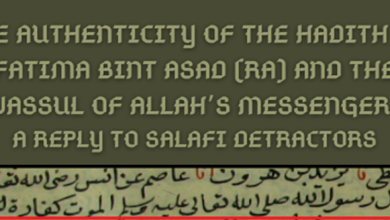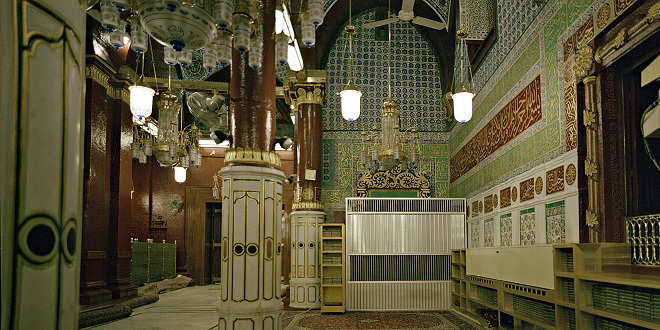Why Imam al-Firabri: The student of Imam al-Bukhari and transmitter of his Sahih was trustworthy (thiqa)
WHY IMAM MUHAMMAD IBN YUSUF AL-FIRABRI: THE STUDENT OF IMAM AL-BUKHARI AND EMINENT TRANSMITTER OF HIS SAHIH WAS TRUSTWORTHY TO THE HADITH SCHOLARS
In recent days some unrecognised Hadith critics have raised the notion with an ulterior motive to demean the status of Sahih al-Bukhari by propositioning their theory that the most well-known transmitter of Sahih al-Bukhari, known as Imam Muhammad ibn Yusuf al-Firabri (or vocalised as al-Farabri by some, d. 320 AH), was not accredited to be reliable (tawthiq) by any contemporary living scholar in his life time, and thus designating him to be a type of unknown narrator (majhul) in terms of veracity (dabt). Such claimants have thus anticipated that his tawthiq was made much later on without reference to any early source to support such a supposition that Imam al-Firabri was accepted to be trustworthy (thiqa) or truthful (saduq) in his actual life time.
Some of these proponents are admirers of our contemporary from Oxford, England, namely, Dr. Mohammed Akram Nadwi. It is worth mentioning what his position is on Imam al-Firabri. He said in his footnote to the Bustān al-Muhaddithin (translated by Aisha Bewley and published as ‘The Garden of the Hadith Scholars’, p. 77, fn. 1) of Imam Abdul Aziz al-Dihlawi (d. 1239 AH), the following:
“The reliable hadith scholar, Abu Abdullah Muhammad ibn Yusuf ibn Matar al-Firabri, the transmitter of the Sahih collection from Abu Abdullah al-Bukhari. He heard it from him two times at Firabr. He also listened to Ali ibn Khashram when he came to Firabr as a murabit. He was born in 231. Hafiz Abu Ali ibn as-Sakan, Abu’l Haytham al-Kushmayhani, Abu Muhammad ibn Hammawayh as-Sarakshi, and Abu Ishaq Ibrahim ibn Ahmed al-Mustamli related from him. It is related, although it is not sound, that al-Firabri said, ‘70,000 men heard the Sahih from al-Bukhari. None of those who related it remains apart from me.’…”
In the original Arabic edition (Bustān al-Muhaddithin, p. 74, fn. 6), Dr. Nadwi used the term thiqa which means reliable or trustworthy for the status of Imam al-Firabri. This term thiqa (ثقة) is a formal grading used by early generations of Hadith scholars to accredit the veracity of a reliable transmitter of narrations.
According to al-Hafiz Abu Ya’la al-Khalili (d. 446 AH) in his al-Irshād fi Ma’rifa Ulama al Hadith (3/959), the last person to transmit the Sahih of Imam al-Bukhari directly from him, was his prominent student known as Imam al-Firabri. The well-known and reliable hadith scholar (Muhaddith) and expert on the praise and dispraise (Jarh wa’l Ta’dil) of narrators known as al-Hafiz Abu Ahmed Ibn Adi (b. 277AH-d. 365 AH), was also one of those who narrated directly from Imam al-Firabri.
Imam Ibn Adi has mentioned in the introduction of his recognized work on weak Hadith narrators known as al-Kāmil fi du’afa al-Rijal (1/84, Maktaba al-Rushd edn) the following guidelines that he utilised as part of his methodology:
وذاكر في كتابي هذا كل من ذُكِر بضربٍ من الضعف، ومَن اُخْتُلِف فيهم، فجرحه البعض وعدله البعض الآخرون، ومرجح قول أحدهما مبلغ علمي من غير محاباة، فلعل من قبح أمره أو حسنه تحامل عليه، أو مال إليه، وذاكر لكل رجل منهم مما رواه ما يُضَعَّفُ من أجله، أو يُلْحِقه بروايته له اسم الضعف لحاجة الناس إليها لأقربه على الناظر فيه.
وصنفته على حروف المعجم ليكون أسهل على من طلب راويا منهم، ولا يبقى من الرواة الذين لم أذكرهم إلا من هو ثقة أو صدوق، وإن كان يُنْسَب إلى هوى وهو فيه متأول
Translation:
“This book of mine shall make mention of all hadīth narrators against whom the slightest amount of criticism was levelled as well as other narrators concerning whom hadīth critics are in disagreement with some validating them and some others invalidating them. I shall give more weight to a particular statement of any of these critics to the best of my knowledge and without any prejudice. This is because criticizing or commending a certain narrator may be motivated by prejudice against or bias in favor of that particular narrator. For each reporter I shall cite some of those narrations they narrated on account of which they have been graded weak, or because of narrating which the characteristic of weakness stuck to them. I shall also cite other hadīths, the narration of which renders its narrators as weak. This I do in consideration of people’s need and in order to facilitate the matter for those critics who verify the status of such narrators.
I have put the names of the narrators in alphabetical order for easy reference. I have also excluded from my book only those narrators who have been graded as trustworthy (thiqa) or truthful (ṣadūq) even if they are accused of a certain innovation (hawā), yet they have a good point regarding its interpretation.”
The underlined portion clearly indicates that any narrator not listed by Ibn Adi in his al-Kamil is either thiqa (trustworthy) or ṣadūq (truthful) to him prior to the completion of his al-Kamil.
Imam ibn Adi related some narrations directly from Imam al-Firabri. Here are two such narrations in al-Kāmil via the link that includes Imam al-Firabri narrating from Imam al-Bukhari:
1/170:
197 – أخبرنا مُحمد بن يوسف بن مطر الفربري، حدثنا مُحمد بن إسماعيل البُخاري، حدثنا مُسَدَّد، حَدثنا عَبد الواحد، حدثنا عاصم، قال: سَألتُ أنس بن مالك عن القنوت، فقال: قد كان القنوت، قلت: قبل الركوع أو بعده؟ قال: قبله، قال: فإن فلانا أخبرني عنك أنك قلت بعد الركوع، فقال: كذب، إنما قنت رسول الله صَلى الله عَليه وسَلم بعد الركوع شهرا، فذكره.
2/118:
1929 – حَدثنا مُحمد بن يوسف الفربري، حَدثنا مُحمد بن إسماعيل البُخاري، حَدثنا إسماعيل بن أَبَان الوراق، قال: أخبرنا القاسم بن معن، عن موسى بن عقبة، عن نافع، عن ابن عُمر، أَن رسُول الله صَلى الله عَليه وسَلم أمر أن تؤدى صدقة الفطر قبل أن يخرجوا إلى المصلى.
قال الشيخ: ولإسماعيل بن أَبَان الوراق أحاديث حسان عمن يروي عنه، وقول السعدي فيه إنه كان مائلا عن الحق، يعني به ما عليه الكوفيون من التشيع، وأما الصدق فهو صدوق في الرواية.
Note also that Ibn Adi did at times give examples of some of his own teachers that he related from directly and then mentioned some type of weakness with regards to their veracity as narrators in al-Kamil under their biographical entries. See for examples under the following entries:
- Al-Hussain ibn Abdul Ghaffar ibn ‘Amr (al-Kamil, 4/33, no. 496). Ibn Adi related directly from him in al-Kāmil (2/275, no. 2455, 3/302, no. 4397)
- Khalid ibn Ghassan ibn Malik, Abu Abas al-Darimi (al-Kamil, 4/334, no. 606). Ibn Adi related directly from him in al-Kāmil (4/335, no. 6252 and no. 6254, 7/590, no. 12249, 10/108, no. 16875, 10/385, no. 17777)
- Abdullah ibn Hafs al-Wakil (7/95, no. 1101, where Ibn Adi mentioned about Abdullah that he would dictate forged Hadiths from his memory and he did not doubt that Abdullah forged them. He also gave an example of a forgery from Abdullah). Despite this expose on Abdullah ibn Hafs, Ibn Adi also narrated some reports on Abdullah’s authority (see al-Kāmil, 1/136, no. 104, 1/315, no. 770, 5/302, no. 7857
There is no biography for Imam Muhammad ibn Yusuf al-Firabri as a weak narrator by Imam Ibn Adi in his al-Kāmil. Hence, Imam al-Firabri was a reliable narrator to his direct disciple, al-Hafiz Ibn Adi, as he narrated from him in various places of his al-Kamil, and thus the above rule mentioned by Imam Ibn Adi with his quoted wording applies directly to Imam al-Firabri: “I have also excluded from my book only those narrators who have been graded as trustworthy (thiqa) or truthful (ṣadūq) even if they are accused of a certain innovation (hawā), yet they have a good point regarding its interpretation.”
Imam Ibn Adi appears to be one of the earliest known scholars that can be mentioned in our time to have deemed Imam al-Firabri to be a reliable transmitter of hadith. It is plausible to state that Imam Ibn Adi also transmitted the Sahih of Imam al-Bukhari directly from Imam al-Firabri, since al-Hafiz Hamza ibn Yusuf al-Sahmi (d. 427 AH) mentioned in his Tarikh Jurjān that a certain Abu Amr Ahmed ibn Muhammad al-Bishri al-Istirābādhi received some of the Sahih al-Bukhari from Imam Abu Ahmed Ibn Adi directly. See Tārikh Jurjān (p. 85, no. 124, Da’iratul Ma’arif, Hyderabad, 1950 edition or p. 126, no. 124, A’lam al-Kutub edition, 1987 edition). Imam al-Sahmi was also a direct student of Imam Ibn Adi’s (see his Tārikh Jurjān, under no. 443).
Another scholar who narrated the Sahih of Imam al-Bukhari directly from Imam al-Firabri was al-Hafiz Abu Ali ibn al-Sakan (d. 353 AH). This was mentioned by Imam Ibn Rushayd al-Fihri al-Andalusi (d. 721 AH) in his Ifādat al-naṣīḥ bi‘l-Taʻrīf bi-Sanad al-Jami al-Saḥih (p. 22), by al-Hafiz Shamsud-Din al-Dhahabi (d. 748 AH) in his Siyar A’lam an-Nubala (10/408 and 16/117, Risala edition) and al-Hafiz Ibn Hajar al-Asqalani in his Fath al-Bari (1/223). In turn, Imam ibn al-Sakan transmitted the Sahih of al-Bukhari to Shaykh Muhammad ibn Isma’il ibn Muhammad Abu Abdullah al-Ansari al-Andalusi (d. 394 AH), as mentioned by al-Hafiz al-Dhahabi in his Tārikh al-Islam (8/741, no. 129, Bashhar Awwad edition).
Al-Hafiz Ibn Asākir (d. 571 AH) reported with his chain of transmission back to Imam Ibn al-Sakan saying the following about Sahih al-Bukhari and some other books of Hadith:
“These are the foundations (qawā’id) of Islam: the book of Muslim, the book of al-Bukhari, the book of Abu Dawud and the book of al-Nasa’i.”
This is a clear proof that Imam Ibn al-Sakan deemed Sahih al-Bukhari to be one of the most important sources for Islamic law and he received this book directly from Imam al-Firabri. This leads one to establish that Imam Ibn al-Sakan considered Imam al-Firabri to be a trustworthy (thiqa) narrator. This is further ascertained by mentioning that Imam Ibn al-Sakan compiled a work which consisted of what he considered to be authentic (Sahih) narrations as per his methodology.
Imam Ibn al-Sakan compiled a Hadith collection known as Sahih Ibn al-Sakan for short, with alternative titles used by previous generations of scholars as: Al-Sunan al-Sihah al-Ma’thura an Rasulillahi Sallallahu alaihi wa sallam (as mentioned by Imam Ibn al-Mulaqqin in his al-Tawdih li-Sharh al-Jami al-Sahih, 2/159 and Shaykh Muhammad ibn Ja’far al-Kattani in his al-Risala al-Mustatrafa fi bayan mashhur kutub al-Sunna al-musharrafa, p. 20), and al-Sahih al-Muntaqa (as mentioned by al-Hafiz al-Dhahabi in his entry for Ibn al-Sakan in his Tadhkiratul Huffaz, 3/100, no. 890).
The Sahih of Ibn al-Sakan is non-extant in our time but previous generations of scholars did have access to it. Imam Taqiud-Din al-Subki (d. 756 AH) quoted a few words from the introduction to Sahih Ibn al-Sakan in his work known as Shifa as-Siqam (p. 112, Ilmiyya edition). Before Imam al-Subki’s time the Hadith scholar known as Imam Abul Hasan ibn al-Qattan al-Fasi (d. 628 AH) quoted one narration from the named work by Imam Ibn al-Sakan in his Bayan al-Wahm wa al-Iham al-Waqi ‘ayn fi Kitab al-Ahkam (2/429) via the route of Ibn al-Sakan from al-Firabri as follows:
قَالَ أَبُو عَليّ بن السكن فِي كِتَابه فِي السّنَن، عَن مُحَمَّد بن يُوسُف، هُوَ – الْفربرِي – عَن البُخَارِيّ، عَن عَليّ بن خشرم، عَن وَكِيع، عَن سُفْيَان، عَن الْأَغَر، عَن خَليفَة بن حُصَيْن، عَن / أَبِيه، عَن جده قيس بن عَاصِم أَنه قَالَ: ” أسلمت فَأمرنِي رَسُول الله – صَلَّى اللَّهُ عَلَيْهِ وَسَلَّم َ – أَن أَغْتَسِل بِمَاء وَسدر “
Al-Hafiz Ibn Hajar al-Asqalani has also quoted in his Fath al-Bari (1/351) from the Sahih of Ibn al-Sakan where the latter narrated from Imam al-Firabri. Since Imam Ibn al-Sakan narrated directly from Imam al-Firabri in his al-Sunan al-Sihah al-Ma’thura, with his condition that what he would incorporate within this collection would be authentic (Sahih) to him, then this leads to the deduction that the sub narrators within his work would also be reliable types of narrators to Imam Ibn al-Sakan. This leads to the conclusion that Imam Ibn al-Sakan must have considered his teacher, Imam al-Firabri, to be a reliable type of narrator.
Imam Abu Muhammad Ibn Hazm al-Zahiri (d. 456 AH) has mentioned a rule that leads to his personal acceptance of Imam al-Firabri to be thiqa (reliable) in his al-Muhalla bi al-Athār. In the introduction to al-Muhalla (p. 1) he said:
وَلْيَعْلَمْ مَنْ قَرَأَ كِتَابَنَا هَذَا أَنَّنَا لَمْ نَحْتَجَّ إلا بِخَبَرٍ صَحِيحٍ مِنْ رِوَايَةِ الثِّقَاتِ مُسْنَدٍ وَلا خَالَفْنَا إلا خَبَرًا ضَعِيفًا فَبَيَّنَّا ضَعْفَهُ، أَوْ مَنْسُوخًا فَأَوْضَحْنَا نَسْخَهُ. وَمَا تَوْفِيقُنَا إلا بِاَللَّهِ تَعَالَى
Translation:
“Let it be known to the one who reads this book of ours that we did not draw evidence except from an authentic (Sahih) narration reported from trustworthy narrators (thiqāt) with a connected chain (Musnad), and we did not leave anything except a narration which is weak and having explained its weakness, or that which is abrogated except that we made clear by that which it abrogated by, and that success is only from Allah.
Ibn Hazm has mentioned a number of narrations via the route of Imam al-Firabri relating from Imam al-Bukhari which he deemed to be authentic based on his introductory principle. See examples in al-Muhalla (1/33, 1/86, 1/103, 1/106, 1/129, 1/216, 1/220 and many more places).
Hence, Imam al-Firabri was deemed to be thiqa by Imam Ibn Hazm al-Zahiri. Note also what Imam Ibn Hazm had to say about the status of Sahih al-Bukhari and Sahih Ibn al-Sakan alongside other famous books of Hadith. Imam al-Dhahabi quoted Imam Ibn Hazm as saying in his Siyar A’lam an-Nubala (18/202):
“The most appropriate books of veneration are the Sahihs of al-Bukhari and Muslim, Sahih Ibn al-Sakan, Muntaqa Ibn al-Jārud, Muntaqa of Qāsim ibn Asbagh and after them, the book of Abu Dawud, the book of al-Nasa’i, the Musannaf of Qasim ibn Asbagh and Musannaf Abi Ja’far al-Tahawi…”
In later centuries the following major scholars also deemed Imam al-Firabri to be trustworthy (thiqa):
- Imam Abul Walid al-Bāji (d. 474 AH) declared Imam al-Firabri to be thiqa mashhur (trustworthy and well-known) as related by Imam Ibn Rushayd in his Ifādat al-naṣīḥ bi‘l-Taʻrīf bi-Sanad al-Jami al-Saḥih (p. 15) with his chain of transmission (sanad) back to Imam al-Bāji.
- Imam Abu Bakr al-Sam’ani (462-510AH) declared Imam al-Firabri to be thiqa (trustworthy) and scrupulous (war’an) in his Amāli (dictations on Hadith), which is fully known as Amali majalis fi’l-Hadith. This grading from al-Sam’ani was mentioned by the following authorities: a) Imam Ibn Nuqta (d. 629 AH) in his al-Taqyīd li-Maʻrifat ruwāt al-Sunan wa-al-Masānīd (p. 126), b) Imam Ibn Rushayd al-Fihri al-Andalusi (d. 721 AH) in his Ifādat al-naṣīḥ bi‘l-Taʻrīf bi-Sanad al-Jami al-Saḥih (p. 15), c) Al-Hafiz Shamsud-Din al-Dhahabi (d. 748 AH) in his Tārikh al-Islam (23/614, Tadmuri edition) and in his Siyar A’lam an-Nubala (15/11, Risala edition), d) Imam Sirajud-Din Ibn al-Mulaqqin (d. 804 AH) in his al-Tawdih li-Sharh al-Jami al-Sahih (2/52), e) Imam Badrud-Din al-Ayni (d. 855 AH) in his Umdatul Qari (2/132)
- Imam Abdul Mu’min al-Dimyati (d. 705 AH) declared Imam al-Firabri to be thiqa (trustworthy) in his al-Arba’in al-Abdal (p. 26)
- Imam Ibn Rushayd al-Fihri al-Andalusi (d. 721 AH) declared Imam al-Firabri to be thiqa amin (trustworthy and honest) in his Ifādat al-naṣīḥ bi‘l-Taʻrīf bi-Sanad al-Jami al-Saḥih (p. 10). He also said in the same work (p. 14) about Imam al-Firabri: “Abu Abdullah al-Firabri is the reliance (umda) of the Muslims for al-Bukhari’s book and his renown forgoes the need to identify his status.”
- Imam Shamsud-Din al-Dhahabi (d. 748 AH) said Imam al-Firabri was thiqa (trustworthy) in his al-Ibar fi-Khabar man ‘Abar (2/9, Ilmiyya edition) and in his Siyar A’lam an-Nubala (15/10) he declared him to be: “al-Muhaddith (the Hadith scholar), al-thiqa (the trustworthy), al-Alim (the scholar).”
- Imam Salahud-Din al-Safadi (d. 765 AH) said that Imam al-Firabri is thiqa in his al-Wafi bi’l-Wafayat (5/245, no. 2315)
- Imam Shamsud-Din al-Kirmani (d. 786 AH) declared Imam al-Firabri to be thiqa in his al-Kawakib al-Darari fi Sharh Sahih al-Bukhari (1/8)
- Imam Muhammad al-Majari (d. 862 AH) declared Imam al-Firabri to be thiqa amin (trustworthy and honest) in his Barnamaj al-Majari (p. 109)
- Imam Ali al-Qari al-Hanafi (d. 1014 AH) declared Imam al-Firabri to be thiqa in his Sharh al-Shifa (1/62, Ilmiyya edition)
- Imam Kâtip Çelebi (d. 1067 AH) who is well known as Haji Khalifa declared Imam al-Firabri to be thiqa in his Sullām al-wusul ila Tabaqat al-Fuhul (3/293)
- Imam Ibn al-Imad al-Hanbali (d. 1089 AH) declared Imam al-Firabri to be thiqa in his Shadharāt al-Dhahab fī Akhbār man Dhahab (4/101)
In conclusion to this article it is clear that Imam al-Firabri was trustworthy (thiqa), and no proof has been located to suggest otherwise from any reputable scholar from his lifetime, let alone in the centuries closest to his time. As for any individual who has attempted to demean his status with a dismissive demeanour in this age, then it is inconsequential and unsubstantiated due to having no supporting witnesses from centuries gone by to hold such a standpoint. Hence, the Muslims at large should not fall for such propaganda aimed at undermining the reliability of not only Imam al-Firabri but the contents of what he transmitted, namely, the Sahih of Imam al-Bukhari.
Peace and blessings be upon Sayyiduna Muhammad.
Abul Hasan Hussain Ahmed
Eid al-Adha 1439 AH/22nd August 2018
darultahqiq.com
Download as a pdf file – HERE






I’m not sure the place you’re getting your information, but
great topic. I must spend some time finding out more or understanding more.
Thank you for magnificent info I used to be on the lookout
for this information for my mission.
Your style is so unique in comparison to other people I’ve read stuff from.
Thanks for posting when you have the opportunity, Guess I’ll just bookmark this blog.